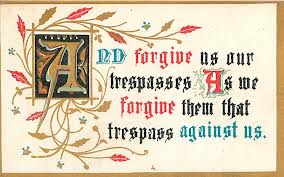 We actually talk about stuff like this in the Church. If a wife tells her husband “I forgive you” is that as effective before God as when the Pastor announces forgiveness in church or private confession? Is it a real pronouncement of God’s forgiveness in Christ or is it a human forgiveness that means we all can just get along?
We actually talk about stuff like this in the Church. If a wife tells her husband “I forgive you” is that as effective before God as when the Pastor announces forgiveness in church or private confession? Is it a real pronouncement of God’s forgiveness in Christ or is it a human forgiveness that means we all can just get along?
Luther also guards against the splitting of forgiveness (before God) and forgiveness (before people) in “A Brief Exhortation to Confession in the Large Catechism where he argues “Thus we have in the Lord’s Prayer a twofold absolution: both our sins against God and against our neighbors are forgiven when we forgive our neighbor and our reconciled with them” (K/W, 477). Citations from Luther abound. Note two in particular. First, from a sermon on Matthew 18:15-18 preached in 1537, Luther says that God’s forgiveness is poured out “in every corner, so that they not only find the forgiveness of sins in the congregation but also at home in their houses, in the fields and gardens, wherever one of them comes to another in search of comfort and deliverance. It shall be at my disposal when I am troubled and sorry, in tribulation and vulnerable, when I need something, at whatever hour and time it may be. There is not always a sermon being given publicly in the church, so when my neighbor or brother comes to me, I am to lay my troubles before my neighbor and ask for comfort…Again I should comfort others, and say ‘Dear friend, dear brother, why don’t you lay aside your burdens. It is certainly not God’s will that you experience this suffering. God had his Son die for you so that you do not sorrow but rejoice” (WA 47:297.36-298.14; quoted by R. Kolb, Martin Luther: Confessor of the Faith, 135). Second, from the Genesis Lectures (1542): “If you want to be absolved from your sins in this manner, go to your pastor, or to your brother and neighbor if your pastor cannot hear you; he has the command to absolve you and comfort you (AE 6:128).
Forgiveness from God through the pastor (SC V/Office of the Keys) need not be made more certain by diminishing the Lord’s forgiveness on the lips of the fellow-believer. The pastor is called and ordained to exercise the Office of the Keys in the midst of the congregation. The word of forgiveness he speaks is not his own but that of the Lord Jesus. His ordination places him “under orders” to forgive and retain sin. At his ordination he vows never to divulge the sins confessed to him. Lay persons are to have the complete confidence that their pastor is doing what the Lord has entrusted to him. The laity are not called and ordained to this Office. All believers live in the stations which they are given in this life (vocation). In these stations, Christians live by faith in Christ and love for the neighbor. To paraphrase the sainted Dr. Kenneth Korby, the sin of the neighbor is God’s call to speak the Word of God to the neighbor. In this context all Christians proclaim law and Gospel, repentance and faith. The words they speak are not their own but Christ’s. His Word does its work wherever it is spoken; it is never merely informational. It is a lively Word of Spirit and life doing the work and accomplishing the will of the God who speaks it. Of this we need no guarantees. Questions of validity are misplaced.
It seems to me that what some of us have forgotten is that God’s mercy is effective in Christ. “According to His mercy He saved us” (Titus 3). We are announcing what Christ purchased with His blood. Who announces it is beside the point. So wives please – forgive your husbands.
I got this from the “Witness, Mercy and Life Together” blog http://wmltblog.org/

